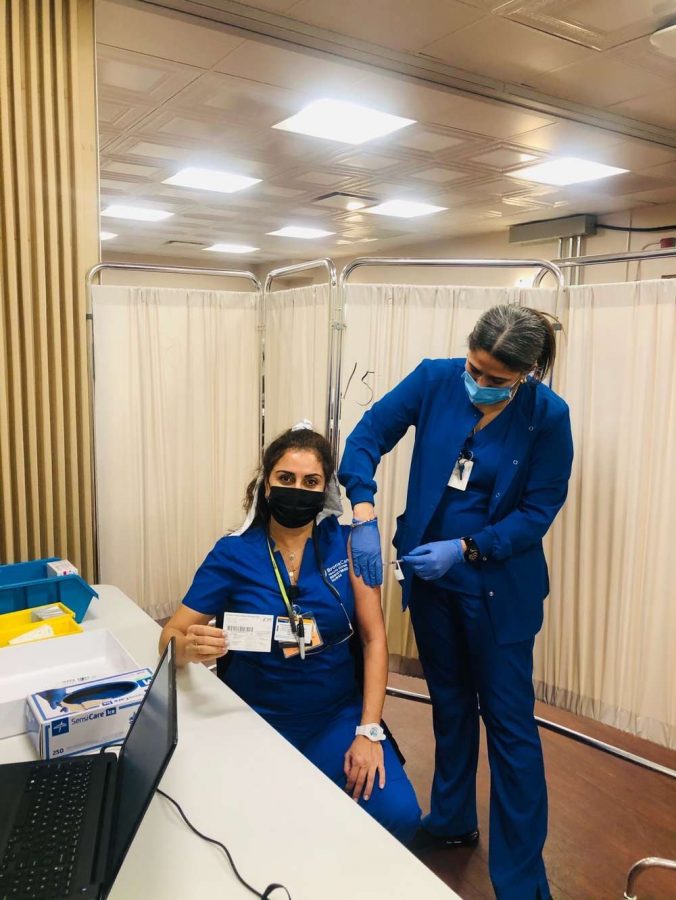Frontline Workers & the COVID Vaccine: Faith and Fears
Some Nurses Express Skepticism, Others Convey Confidence
COVID Nurse Receives Her Second Round of Vaccinations
January 15, 2021
COVID has been the biggest threat to the U.S. since this virus infiltrated the nation in the early months of 2020. On top of all those who have lost their lives in the pandemic, the amount of families separated, events cancelled, and holidays ruined, the group of people that have been consistently on the frontline have been nurses and doctors. Working tirelessly to combat the virus, they have been some of our country’s hardest workers and have put themselves on the line for the lives of others.
In the wake of the vaccine’s development and subsequent release, it was only right that nurses and doctors were the first to receive it. However, despite the release of the vaccine and the hope for our country, not everyone is willing to take it. Multiple nurses at the BronxCare Hospital Center, a hospital that once led the state in COVID cases, gave their input on COVID and the vaccine.
Assistant Nurse Manager at the hospital, Fionna Crowley was one of the first people at the hospital to get vaccinated, and when asked about any initial side effects she said that there were just low level arm pains, and mild headaches. When asked about COVID as a whole and the challenges the hospital faced Crowley said, “Staffing; people were getting sick left, right, and center. Nurses, doctors and staff as a whole. One day you walk in with five other nurses and the next day they are all sick.”
Registered Nurse Amanda Bruno was another early inoculated nurse, and when asked about her side effects, the answer was consistent: mild aches and pains. However, she said that she did have some concerns about the vaccine, stating that she believes it may have come out too soon, and feared that it was rushed. Despite this, she got the vaccine to set an example for her family, who were also nervous about it, in order to show that it is effective.
While there were some nurses that got the vaccine, there were others that chose not to take it as of yet. Two nurses who did not receive the vaccine stated similar concerns including that they distrusted the medical companies and the government, both believing the vaccine came out too soon and that it was forced out.
A nurse who wishes to stay anonymous said, “I just have a distrust in all of Big Pharma, and it’s just too new and forced for me to take it.”
Another nurse I spoke to, Myrantz Assad, is also against the vaccine as a registered nurse. He is currently acting as a traveling nurse, meaning he goes around the country helping hospitals hit the hardest with COVID. He gave multiple reasons for why he was against the vaccine. His first issue was with the political interference, saying that politicians seemed to be too involved in the process and its release, thinking that President Trump pushed it out too fast for the sake of political credit. He also said that he thinks the CDC and the FDA ‘bowed down’ to the federal government’s wishes with the vaccine and its distribution, and for that he gained a lot of distrust in it. However, he stated that he has always supported vaccines, and advocates for people to get them. He even said he will most likely get the COVID vaccine once he sees its effects after the first few distributions are complete.
Part of his skepticism stems from other instances where government experiments met unfortunate ends: including failed and, not to mention, ethically ambiguous experiments such as the Guatemala syphilis experiments and more. Myrantz, being a black man, felt skeptical about the vaccine due to the fact that the majority of failed government medical experiments were executed on people of color.
Registered Nurse Suhair Vermes, who was one of the first people to complete the vaccine process of receiving both shots 17-21 days apart, was asked about her side effects. For the first dose Vermes had tenderness at the point of insertion, generally mild side effects. However the second time, she said she had tenderness, shoulder and neck pain, mild headaches, and mild fatigue for the first 48 hours after the dosage.
Vermes said, “I treated so many patients that didn’t make it, and I didn’t want that to be my fate… I want to lead by example, for others to feel confident in the process. I just want our country’s health, livelihood, and economy restored.”




